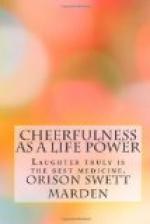“Difficulties melt away before the man who carries about a cheerful spirit and persistently refuses to be discouraged, while they accumulate before the one who is always groaning over his hard luck and scanning the horizon for clouds not yet in sight.”
“To one man,” says Schopenhauer, “the world is barren, dull, and superficial; to another, rich, interesting, and full of meaning.” If one loves beauty and looks for it, he will see it wherever he goes. If there is music in his soul, he will hear it everywhere; every object in nature will sing to him. Two men who live in the same house and do the same work may not live in the same world. Although they are under the same roof, one may see only deformity and ugliness; to him the world is out of joint, everything is cross-grained and out of sorts: the other is surrounded with beauty and harmony; everybody is kind to him; nobody wishes him harm. These men see the same objects, but they do not look through the same glasses; one looks through a smoked glass which drapes the whole world in mourning, the other looks through rose-colored lenses which tint everything with loveliness and touch it with beauty.
Take two persons just home from a vacation. “One has positively seen nothing, and has always been robbed; the landlady was a harpy, the bedroom was unhealthy, and the mutton was tough. The other has always found the coziest nooks, the cheapest houses, the best landladies, the finest views, and the best dinners.”
“Whatis an optimist?”
This is the question a farmer’s boy asked of his father.
“Well, John,” replied his father, “you know I can’t give ye the dictionary meanin’ of that word any more ’n I can of a great many others. But I’ve got a kind of an idee what it means. Probably you don’t remember your Uncle Henry; but I guess if there ever was an optimist, he was one. Things was always comin’ out right with Henry, and especially anything hard that he had to do; it wa’ n’t a-goin’ to be hard,—’t was jest kind of solid-pleasant.
“Take hoein’ corn, now. If anything ever tuckered me out, ‘twas hoein’ corn in the hot sun. But in the field, ’long about the time I begun to lag back a little, Henry he’d look up an’ say:—
“‘Good, Jim! When we get these two rows hoed, an’ eighteen more, the piece’ll be half done.’ An’ he’d say it in such a kind of a cheerful way that I couldn’t ‘a’ ben any more tickled if the piece had been all done,—an’ the rest would go light enough.
“But the worst thing we had to do—hoein corn was a picnic to it—was pickin’ stones. There was no end to that on our old farm, if we wanted to raise anything. When we wa’n’t hurried and pressed with somethin’ else, there was always pickin’ stones to do; and there wa’n’t a plowin’ but what brought up a fresh crop, an’ seems as if the pickin’ had all to be done over again.
“Well, you’d’ a’ thought, to hear Henry, that there wa’n’t any fun in the world like pickin’ stones. He looked at it in a different way from anybody I ever see. Once, when the corn was all hoed, and the grass wa’n’t fit to cut yet, an’ I’d got all laid out to go fishin’, and father he up and set us to pickin’ stones up on the west piece, an’ I was about ready to cry, Henry he says:—




